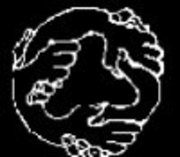Root causes of the crisis
It is easy to blame anyone of course, when everything spectacularly failed like this case of Rohingya/Bengali fleeing en masse from their homes. Within a periods of six weeks in September to October in 2017, an estimated 400,000 refugees had crossed border into Bangladesh. What are the underlying factors that have driven the refugees to flee in such panic manner ? The specific answers are still needed for the recent influx. Although the immediate answers for recent influx are not readily available, one could still examine concurrent roots of the problem, so as to provide us the guidance for possible answers.
Underlying Political Roots: Political Forces
The Muslims of Burma by Moshe Yegar (1972) |
|---|
For the Rohingya/Bengali political leadership, the 1991 exodus had given the chance to energize their movement against the Burmese government's long-held oppressions. With the 1991 Rohingya refugee crisis, there were outpouring of sympathy for the oppressed by World's community. Therefore, the 1991 events had undoubtedly resurrected the old aspirations set out on by Jamiatul-Ulama. The Rohingya leaders, once again, had build-up their political campaign based on this popularity. Public promotion of political identity "Rohingya", along with the claims as the bona-fide natives of Arakan have, once again, resurfaced.
The third political force at play is the Burmese people and their political leadership -- both military and civilian. After 3 decades, the Burmese people have never heard the word "Rohingya" and they would not accept the claims the Rohingya is another indigenous group in Burma. With typical political laziness ( ), most Burmese will not investigate the accuracy of this claim, but rather happy to leave such group as the Bengali immigrants or, even worse, the illegal-immigrants from Bangladesh.
The pro-Rohingya groups' unchecked political campaign
We are here, once again, to be reminded that, in the 1990s, no one really knows about the origins of "Rohingya", nor has that been sure its an entirely invented word. Only very few knowledgeable Burmese might be able to point out the majority of Rohingya/Bengali are the descendants of immigrants after first Anglo-Burman war of 1824-1826. In any case, with the oppressive Burmese military leadership had been in charge those days, no Burmese would have given any bother to point out the inconsistencies about the claims made by Rohingya campaigners. Within this atmosphere, the political campaign conducted by pro-Rohingya activists to reassert the "Rohingya Identity" indeed have had an unchecked free-run, particularly in the global media circle.
| The AFPFL Secretariat Communication to Jamiatul Ulama (PDF Downloads) |
|---|
Self-check Action by Burmese military
Rohingya Issue by Professor Kei NEMOTO, 2005. |
|---|
Burmese Military's Political Responses
When encountering with popular campaigns, the Burmese military indiscriminately uses violence on any political groups. Within Burma, those seek to promote 'Rohingya Identity' were targeted for persecution. Throughout 1990s, there were numerous intimidation, arrests and prohibition of pro-Rohingya advocates.
Externally, the military dig in its own position whenever encountering questions on the "Rohingya Identity". Burmese military hasn't known for a good political communication, and they will simply repeat single message such as, "Rohingya is not one of our 135 national races". Whilst that's true, there would never be how or why that has been the case.
Of course, unusual situation where the military cannot arrest pro-Rohingya activists, it's certain to use all other violent tactics at its disposal: this time to intimidate the entire Muslim populations in Burma. That has become the case for The 2012 Rakhine State Riots.
The 2012 Rakhine State Riots
Rohingya MPs Letter to Burmese Human Rights Commission (Feb-2012) in Burmese. |
|---|
"(E) since successive government have said "Rohingya" as indigenous race and none of the governments specifically proclaimed the "Rohingya" is not an indigenous race, there is therefore legitimacy to such a claim."
The Burmese military, no doubt, would have been furious by the claims of these MPs; but the government cannot possibly arrest its own MPs! The Burmese military's response to this was predictable. The rise of Buddhist 969 anti-Muslim hate groups, along with May-June 2012 Rakhine Riots were indicative of the way in which Burmese military dealt with such unacceptable claims. Of course, these anti-Muslim hate campaigns do resonate with ordinary Burmese people. These Muslim hate groups in Burma still have significant momentum and public support as of today.
(On The Next Posting: Possible Causes for Rohingya/Bengali Flight of 2017)
| FAQ-01 || | FAQ-02 || | FAQ-03 || | << FAQ-04 || | >> FAQ-05 || |
|---|
